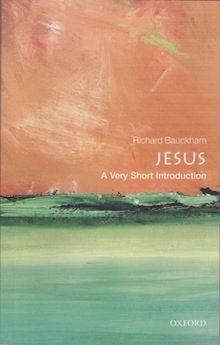You wouldn’t even try to count the number of books written about Jesus. Most of them would have value, I guess, but some are long and scholarly, others lack a good historical basis.
But here’s one that is short, written by a respected historian and is encouraging to faith. What’s not to like?
It is the best introductory book about Jesus I have read. I think you’ll find it helpful and stimulating, and you’ll want to lend it out. Here’s why.
Richard Bauckham
Richard Bauckham is a retired professor of New Testament. He has written many books, and his Jesus and the Eyewitnesses is an innovative classic. After a lifetime of study, teaching and writing, he knows the New Testament background and scholarship very well.
The book
This book is one of almost 400 in the “Very Short Introduction” series published by Oxford University Press. At only 125 pages, and small enough to fit in your pocket, it lives up to its subtitle.
Bauckham has been able to cover pretty much everything you need to know about Jesus and explain it simply. Chapter headings are:
- Jesus – a universal icon
- The sources
- Jesus in his 1st-century context
- Enacting the kingdom of God
- Teaching the kingdom of God
- A question of identity
- Death and a new beginning
- Jesus in Christian faith
Bauckham outlines the conclusions of historians without explaining much of the alternative views (which would make it a very long introduction!). To cover all this territory, he has to adopt a viewpoint to steer his way through the disagreements among scholars.
He says upfront that he takes the view that the gospels are “substantially reliable sources”, recognising that many scholars would contest this view. But argues in chapter 2 why he thinks this is a reasonable conclusion (argued in much greater detail in Jesus and the Eyewitnesses).
Thus the reader gets a moderate scholarly view, avoiding the extremes of sceptical scholarship and devotion without much historical basis. This means, I think, that both believers and unbelievers can get a lot out of this book.
Insights and highlights
The main value of the book is as a concise summary of all that we may have learnt about Jesus from more detailed sources, but it still had many highlights for me:
- It begins where Jesus began, with the kingdom of God.
- The background chapter 3 is comprehensive, covering the political context, Judaism and the parties or sects at the time, Galilee, messianism and John the Baptist.
- It is clear that healing played a major part in how Jesus enacted the rule of God in human society, but Bauckham shows that meals and hospitality give us another view of the kingdom.
- Jesus saw his mission from God as renewing the people of God; he was especially interested in the inclusion of the poor and marginalised, who were often excluded.
- He discusses Jesus’ apparent preference for “indirect communication”, via actions, parables, aphorisms, images and figures of speech (many of which he believes were “carefully crafted”, not extempore, and used mnemonics), and how this might indicate that he was trying to provoke thought as much as teach, and he wanted to help his disciples to remember what he said. (I can’t help thinking that christian communicators and pastors today should learn from this.)
- Jesus characteristically saw God as a father rather than as a king, as was more common among Jews. Much of what he did and said came out of his intimate experience of his loving father.
- Jesus summarised the Torah with the commands to love God and neighbour (which included enemies), which it seems aimed to move away from pedantry and precedent towards “the integrity of the heart”.
- His discussion of Jesus’ identity starts with Jesus’ authority (seen in healings and exorcisms and recognised even by his opponents), moves onto Messiah and why Jesus would be cautious of making an overt claim.
- He discusses why, unlike many scholars, he is inclined to accept the gospel of John as a historical recollection but written interpretively.
- He brings out several small but significant background facts that illuminate our understanding of Jesus’ death and resurrection.
The bottom line
If you want to enrich your understanding of Jesus with the insights of a leading scholar, or you want to help someone else do that, I recommend this book wholeheartedly. (Five stars)
